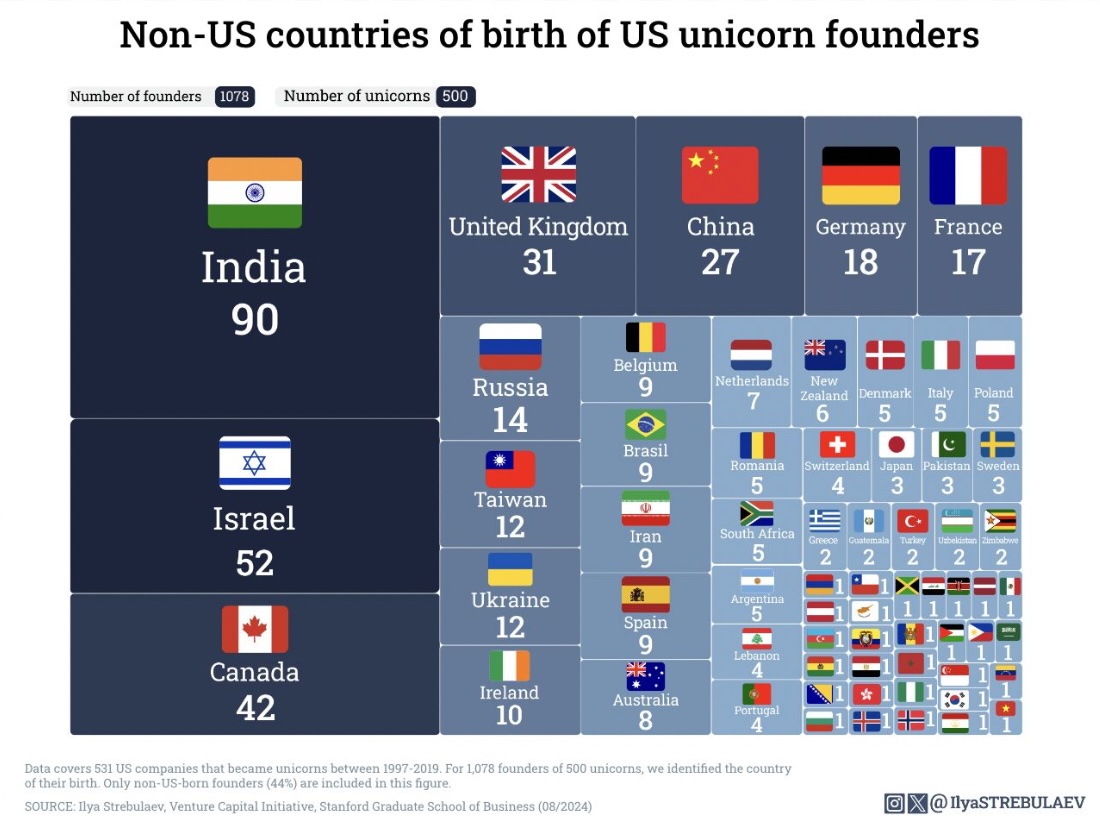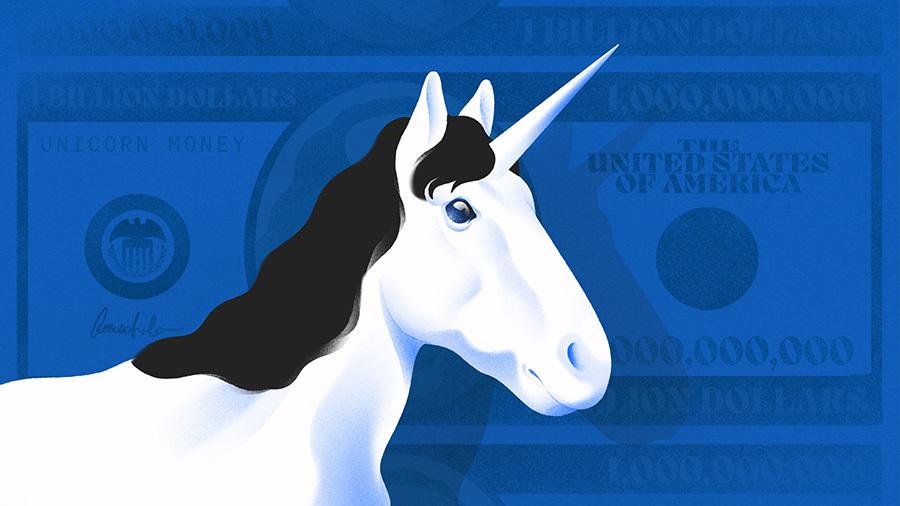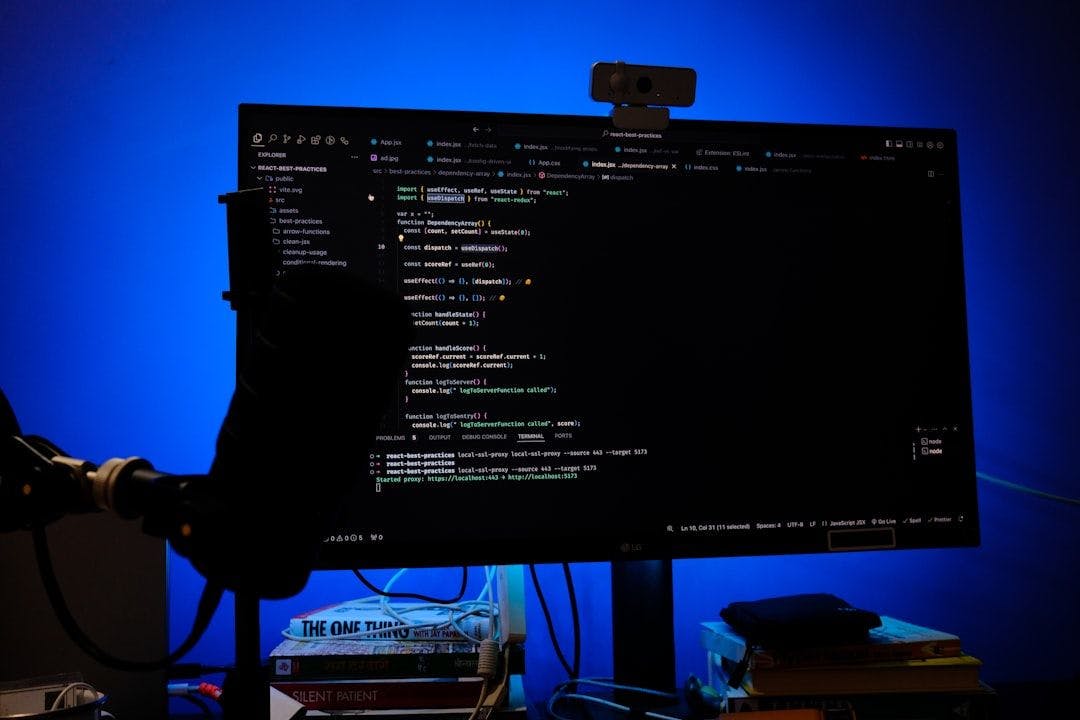The next time someone talks about restricting immigration, show them this: Nearly half of America’s billion-dollar startups were founded by people born outside the United States. Our research at Stanford’s Venture Capital Initiative shows that immigrant entrepreneurs aren’t just contributing to the U.S. innovation ecosystem — they’re helping to lead it.
44% of US unicorn founders are immigrants, with India leading
Source: https://www.linkedin.com/in/ilyavcandpe/
The analysis of 1,078 founders behind 500 U.S. unicorns found that 474 founders — 44% — were born outside the United States. Nearly half of America’s most successful entrepreneurs came from somewhere else.

India tops the list with 90 unicorn founders, including Laks Srini of TriNet Zenefits and Jyoti Bansal of AppDynamics.
Israel follows with 52 founders, including Daphne Koller of Coursera, Adi Tatarko of Houzz, and Eyal Navon of Hippo Insurance. From Canada, we have 42 founders, including Stewart Butterfield of Slack, Shane Smith of Vice Media, and Michelle Zatlyn of Cloudflare.
The trend extends well beyond these top contributors. Our research identified unicorn founders from 65 different countries spanning six continents. Each region has its standouts:
- Europe: The U.K. (31 founders), Germany (18), France (17), and clusters from Belgium, Netherlands, Spain and others;
- Asia: India leads, followed by China (27) and Taiwan (12), plus contributions from Japan, Pakistan and elsewhere;
- Latin America: Brazil (9), Argentina (4) and Guatemala (2);
- Africa: South Africa (5) and Zimbabwe (2); and
- Oceania: Australia (8) and New Zealand (6).
When Paul Maritz of Pivotal Software arrived from Southern Rhodesia (now Zimbabwe), Amr Awadallah of Cloudera from Egypt, and Luis von Ahn of Duolingo from Guatemala, they didn’t just bring their talents — they brought diverse perspectives that helped them spot opportunities others might miss.
Why moving to America works

It’s not just about who comes to America — it’s also about companies that make the move. Our data shows that 8% of U.S. unicorns (88 out of 1,108) were initially founded outside the United States before relocating.

The relocation effect is powerful. Israeli startups that moved to the U.S. were 9x more likely to achieve unicorn status than those that stayed home. The pattern holds for other countries too: Indian startups that relocated to the U.S. enjoyed a 6.5x advantage, while U.K. companies saw their chances improve by 2.5x.
These aren’t just statistics — they’re success stories like Slack (from Canada), Unity (from Denmark) and Headspace (from the U.K.). This pattern suggests that while great ideas can start anywhere, the American ecosystem offers unique advantages for scaling.
Where do international unicorns land?

When international founders come to America, they don’t all head to the same place. While California remains the magnet attracting unicorns from around the world, we found interesting patterns in where companies choose to establish themselves.
For unicorns leaving Israel, New York often proves more attractive than California. Meanwhile, 15% of all U.S. unicorns have changed their headquarters at least once between founding and reaching unicorn status. The most frequent destinations? California, New York, Massachusetts and Texas.
These location choices matter. Local ecosystems, regulatory environments and talent costs all factor into a startup’s chances of success. For international founders, picking the right location in the U.S. can be as strategic as the decision to relocate in the first place.
US unicorns employ talent globally, not just locally
The impact of international talent extends far beyond founding teams. When we analyzed the employee locations of 191 California-based unicorns, we found that only 38% of their 375,000 employees were actually in California. About a third were elsewhere in the U.S., and nearly a third were overseas.
India stands out here too, accounting for 6% of California unicorns’ global workforce — the largest international concentration. Other notable examples include Eventbrite‘s 17% workforce in Argentina, Thumbtack‘s 21% in the Philippines, and Evernote‘s 12% in Chile.
Israeli immigrants create unicorns at highest rate per capita
Here’s where the story gets even more interesting. When we compared the number of unicorn founders from each country to their share of first-generation immigrants in the U.S. population, we found striking variations in “unicorn productivity.”
Israel leads dramatically, with 43.4 unicorn founders per 100,000 first-generation Israeli immigrants. New Zealand follows at 37.3 and Belgium at 24.4. By comparison, India’s rate is just 2.5 per 100,000 first-generation immigrants, while Canada’s is 5.3.
This doesn’t diminish India’s contribution — 90 unicorn founders is still the highest absolute number from any country. But it suggests that different immigrant communities may have different paths to entrepreneurial success in America, influenced by factors like education, professional networks and access to capital.
Why this matters: innovation’s global roots
What’s clear from our research is that America’s innovation ecosystem thrives on global talent. The nearly even split between U.S.-born and immigrant founders suggests a powerful complementarity — different backgrounds and perspectives combining to create something greater than either could alone.
For policymakers, the message is straightforward: Attracting and retaining global talent remains crucial to maintaining America’s edge in creating high-growth companies. For entrepreneurs, it suggests that the American dream of building a world-changing company remains very much alive, regardless of where your journey began.
And for everyone interested in what drives innovation, our findings offer a reminder that breakthrough companies often emerge when different worlds collide — when founders bring perspectives from one context and apply them to challenges in another.
In the end, the story of unicorn creation in America is increasingly a global one — where the best ideas and most determined entrepreneurs find their way to an ecosystem that helps them scale, regardless of where they were born.
Ilya Strebulaev is the foremost academic expert on venture capital. As the founder of the Venture Capital Initiative and a professor of private equity and finance at Stanford University’s Graduate School of Business, where he teaches a popular class on venture capital, his research has been widely published in leading academic journals and featured in The Wall Street Journal, The New York Times, Bloomberg and the Harvard Business Review. He frequently leads workshops and executive sessions for senior business and government leaders around the world and has consulted for companies and investors on the venture industry trends and corporate innovation. In 2023 he was named a Top Voice on LinkedIn. (https://www.linkedin.com/in/ilyavcandpe/).
Note on methodology and sources
For this study, we define unicorns as VC-backed, U.S.-based companies that achieved a confirmed $1 billion-plus post-money valuation in a primary private round or had a liquidity event (such as an IPO or an acquisition) at a confirmed $1 billion-plus valuation between 1997 and 2021. To construct our unicorn list, we started with “unicorn candidates” from well-known sources such as Crunchbase and TechCrunch, as well as from datasets that report private funding round and liquidity event details, such as Crunchbase, PitchBook and VentureSource. We then manually confirmed and cross-checked the location and funding details to decide on the inclusion of each company in our final unicorn list. This process resulted in a total of 1,110 unicorns. For each unicorn we also identified a peer U.S.-based VC-backed company that raised its first venture round in the same year. We call the sample of such peers a random sample. For each of the companies in the unicorn and random samples we identified founders and co-founders (we use “founder” and “co-founder” interchangeably) from all the sources mentioned above, LinkedIn, public filings, and many others. In total, we identified and confirmed 4,975 founders (different data exercises may use subsamples of this data).
:
Illustration: Dom Guzman

Stay up to date with recent funding rounds, acquisitions, and more with the
Crunchbase Daily.










